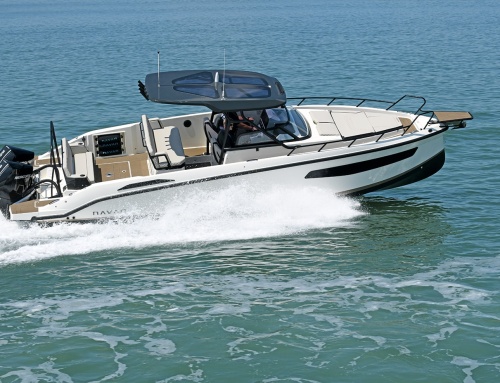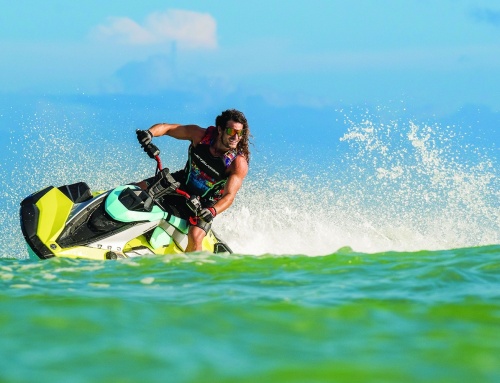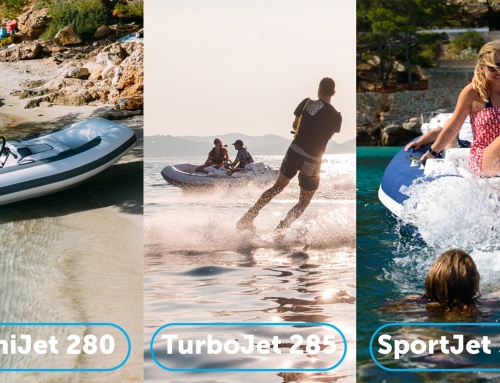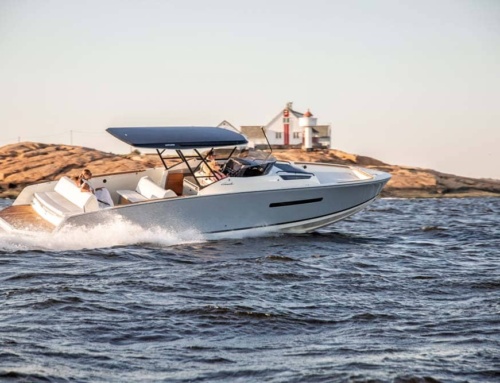HMS is tempted to begin ‘extending his weekends’ after testing the latest twin 400hp offering from Swedish builder Nimbus Boats. The W11 readies Nimbus to now tackle some of the biggest markets in the world …
The new Nimbus W11 takes its place alongside the Weekender, Tender and Commuter series, which the company first presented back in 2018. Consisting of eight models in all, the handsome new W11, the subject of our test, now completes what is already a very comprehensive line-up. Jonas Göthberg, Commercial Director and Brand Manager of Nimbus Group AB, had this to say about the latest addition: ‘The series to date has been immensely successful for us. But with the introduction of the new W11, we’re confident our “full house” has even more strength behind it now to help drive new opportunities for us, including the USA – a territory that, of course, represents one of the largest markets in the world.’
We took a walkaround the Nimbus W11, watch the video.
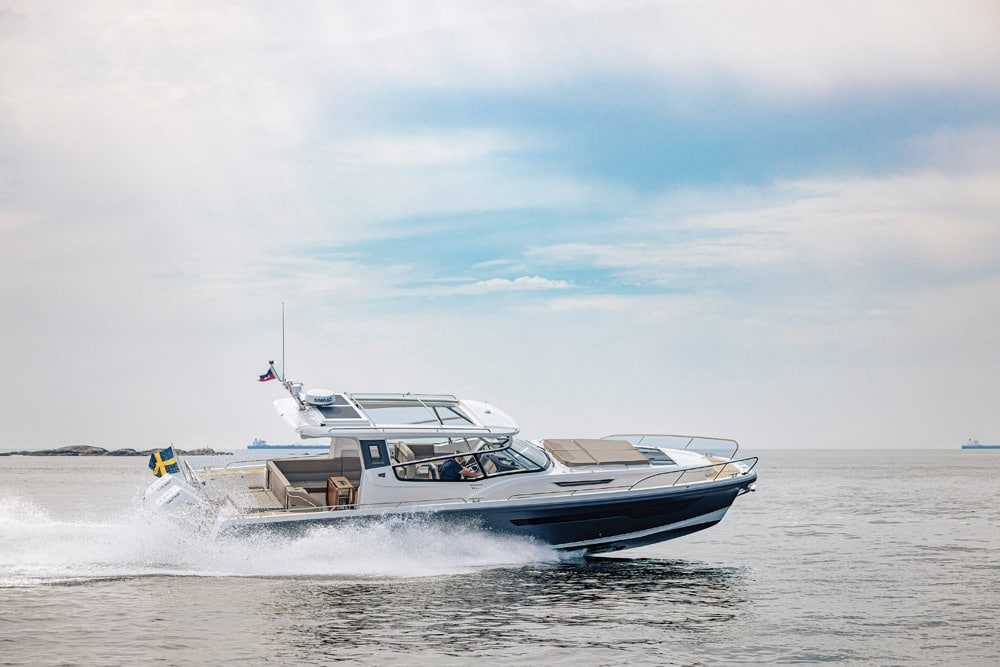
Nimbus W11 underway
The undercarriage
When a new model is launched, most of the emphasis centres on the vessel’s interior, its facilities and so forth. Now, that’s all well and good, but in so many instances, the boat’s all-important underside is barely mentioned or referred to at all. So let’s just clarify this aspect of the W11’s anatomy from the get-go by saying that the Nimbus W11 features the same stepped hull as its already successful and proven T11 and C11 counterparts. Fitted with twin Mercury V10 outboard engines, the boat not only benefits from a low planing threshold but is also capable of achieving an all-out top speed of 49 knots. That said, to my mind at least, she feels much more like a ‘Grand Tourer’ to drive, with the hull giving every impression of being at its happiest and most comfortable at speeds in and around the mid to late 20s. Her steps and chines certainly generate a very level running attitude, and her sharp prow presents well to the sea with enough length in the hull to make light work of any short, sharp chop. Set the throttles to the optimum cruising speed relative to the conditions and the W11 will go all day long – no fuss, no flying of her head, just a steady and seemingly effortless coursing through the water, which passengers and guests alike will no doubt be very reassured by.
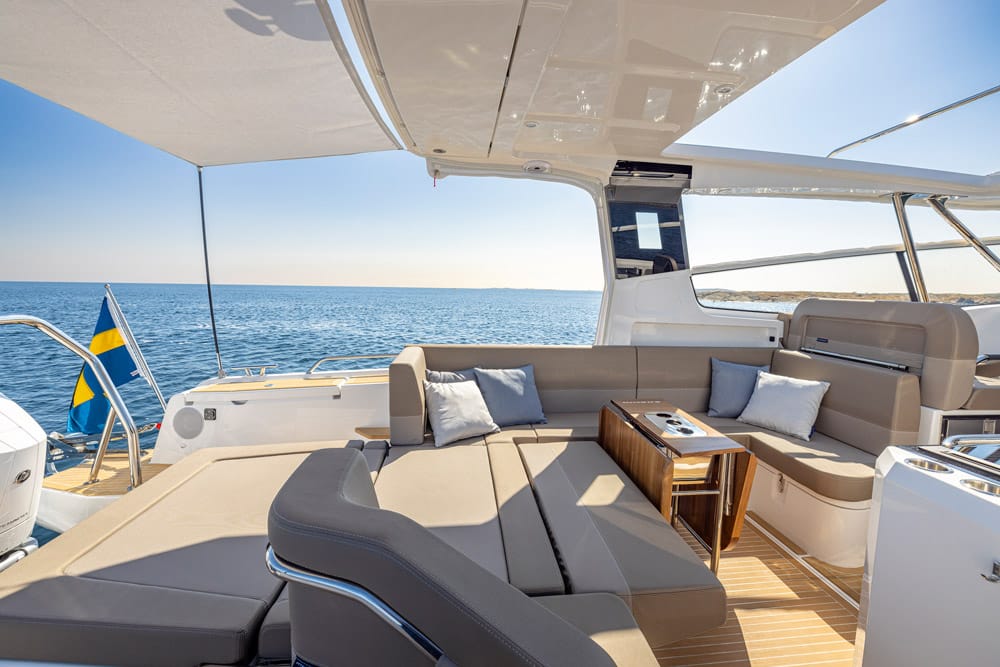
Adjustable seating front and aft offer flexibility all round.
Easy living
This latter attribute is critical to the likes of the W11, because so much of this vessel’s design relates to its social functionality. Joacim Gustavsson, Chief Designer at Nimbus, told PBR: ‘The W11 is all about seeking to find that happy harmony between performance and comfort. In this regard, the internal design of the boat’s cockpit and aft-deck lounge area works to ensure guests and passengers not only feel very secure underway, but also when the hull is at rest. It was our aim to make the W11’s spacious layout and its deck features combine to make a really beautiful habitat for socialising and enjoying one’s surroundings.’ ‘Easy living’, Nimbus call it, and I think in many ways this describes the W11 well. The design of her adjustable seating arrangements, multiple sunbeds fore and aft (the forward lounger being set atop a raised platform to prevent water capture), a fabulous starboard-side outdoor galley, ample storage for all manner of gear and toys (some 2500L worth in all) and the boat’s super-generous degree of deck space are all benefits, among others, that contribute to the successful achievement of both space and very agreeable living.
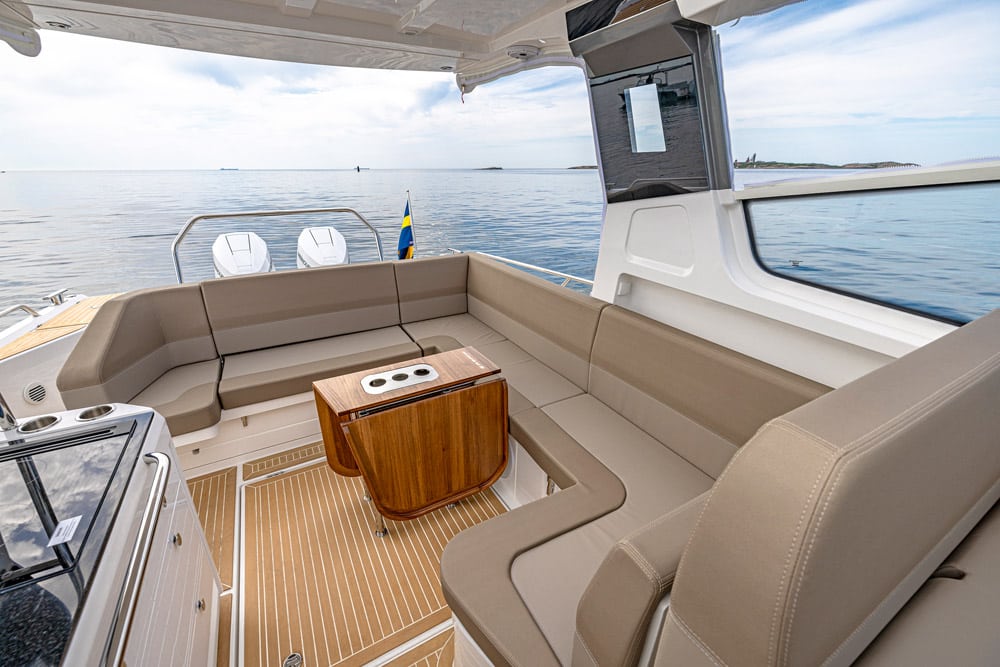
Fabulously large and comfortable social space perfect for entertaining.
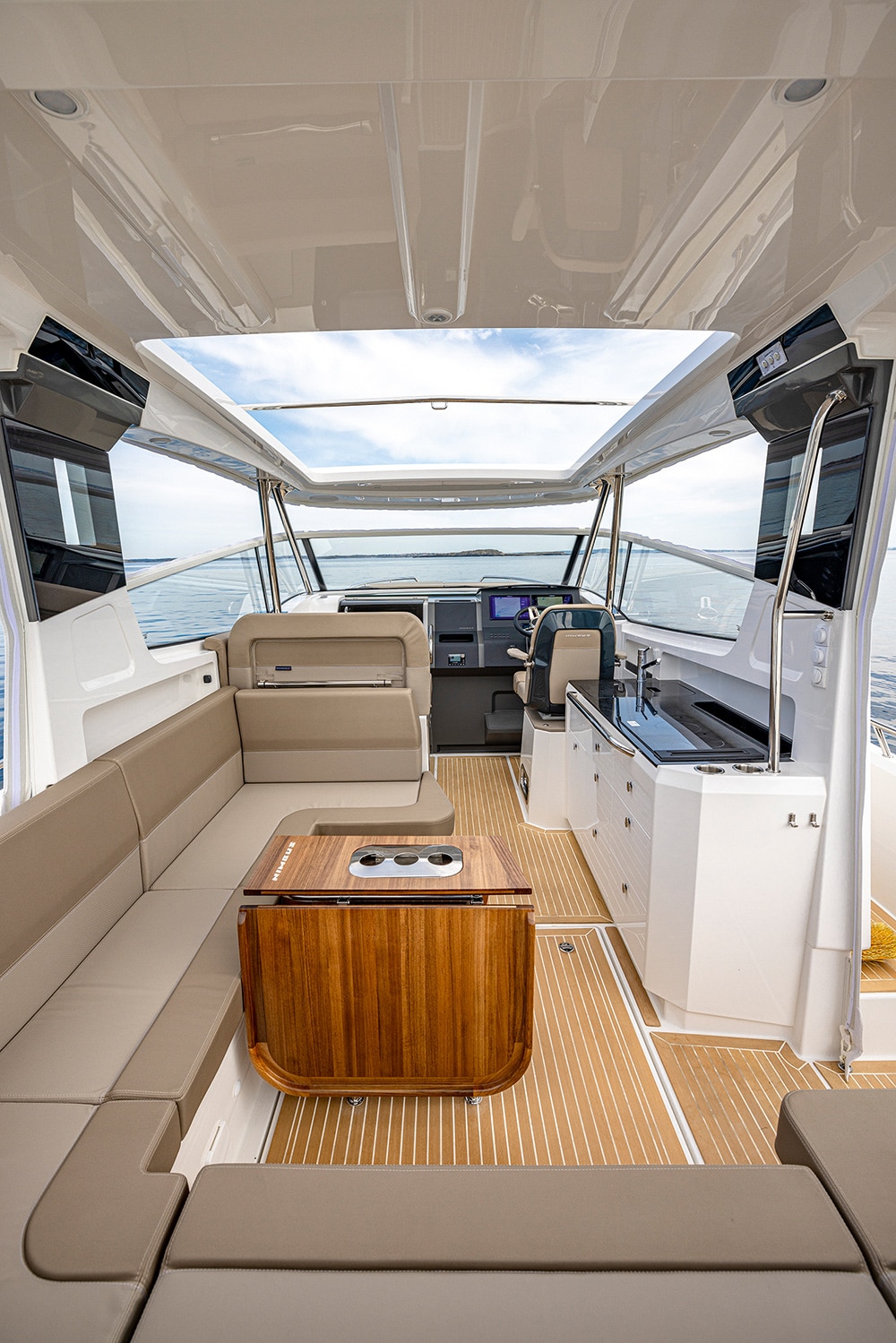
Plenty of dining space with the fold out table
Within the spec, though, there are two features I particularly like. The first is the folding side balconies or gunwales, which increase the amount of usable deck space when at rest dramatically. This engineering is not unique to Nimbus, of course, but it certainly does transmute the whole of the aft deck, and one can’t deny that it adds a certain ‘wow factor’. The second is the optional hydraulic bathing platform/passerelle that extends aft of the engines, which upon the press of a button transforms itself from simply being a large bathing platform into an entire staircase leading to and from the ocean!
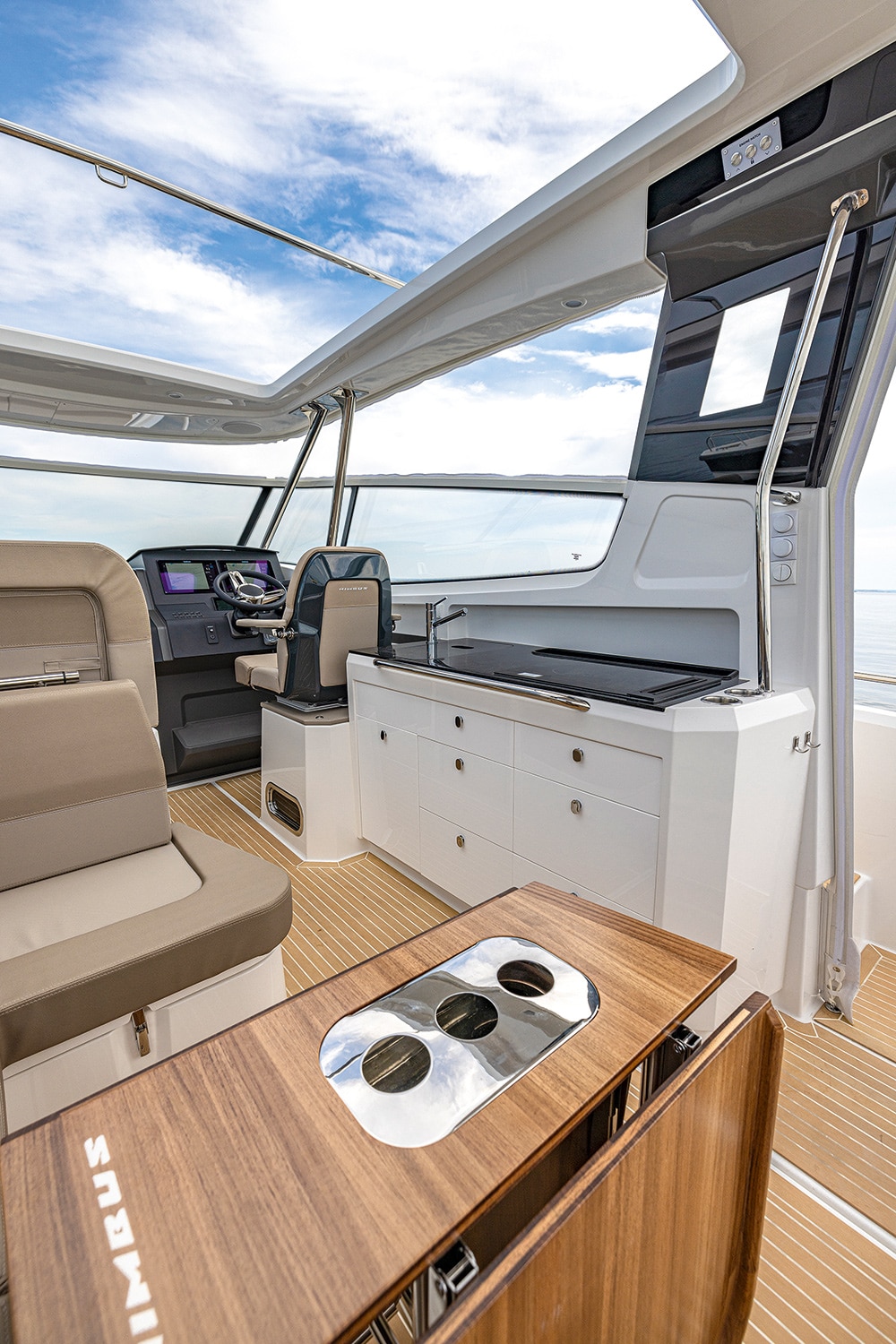
Open, easy-living, beautifully achieved.
Technicalities aside
While the W11’s technical systems are undeniably complex, from a user’s point of view, the boat has an air of simplicity about her that is commendable. For example, the T-top-protected cockpit with its flight deck of twin 12in NSX plotters and corresponding Mercury-orientated hardware constitutes a helm position second to none. Both ergonomically and aesthetically, this area of the W11’s make-up is a joy to behold, as well as being a pleasure to operate. Good all-round vision, plenty of natural light via the electric sunroof and the ability to move fore and aft unhindered either side of the central console are also undoubtedly additional pluses in the W11’s favour.
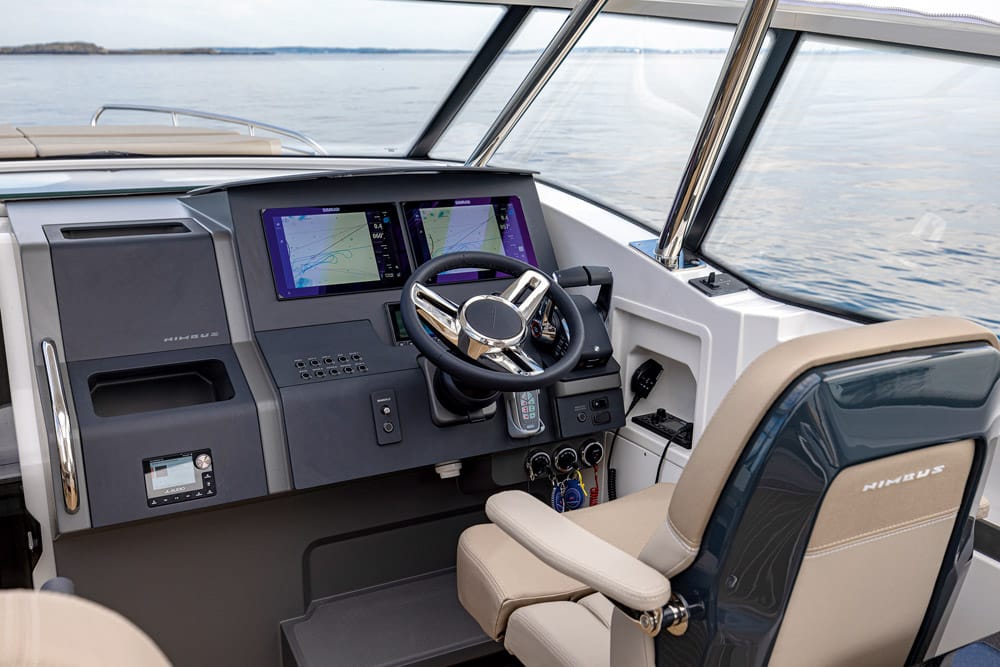
Ergonomic helm with latest technology.
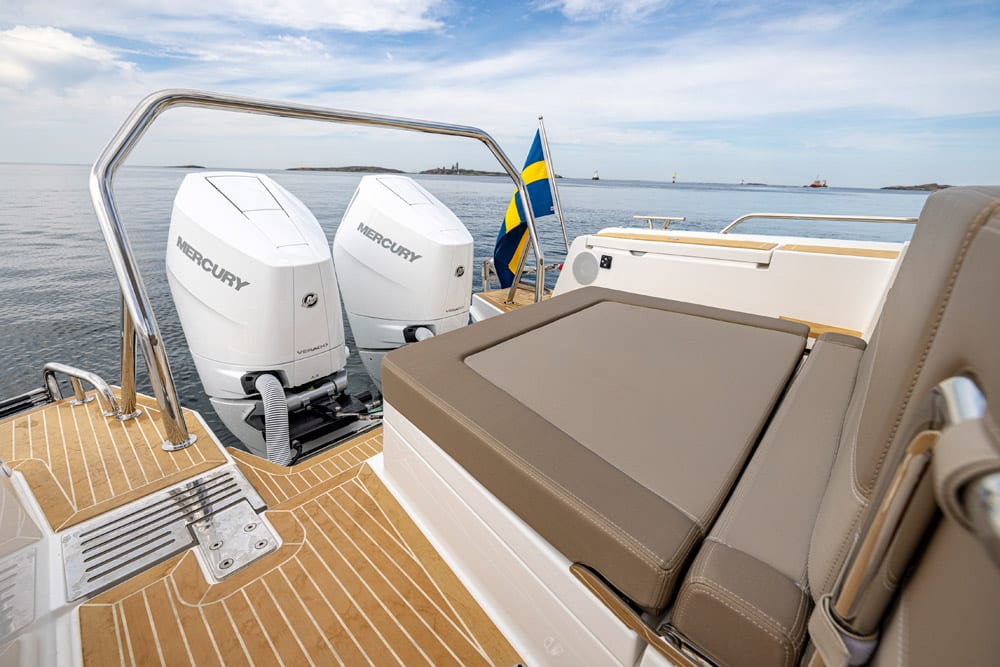
Sun-lounger.
The more you move around this craft, the more the insight shown on the part of Joacim Gustavsson and his team becomes apparent. For those who favour such, this includes the employing of Ecodeck – a good move surely, as this greener specification option, instead of the more ‘standard’ teak, utilises recycled plastics in its make-up. Solar panels to the roof of the T-top linked to lithium-ion power banks provide the W11 with another semi-sustainable solution. I would hazard a guess that a good number of such ideas are derived from customer interaction and feedback. But certainly, both functionality and form are evident wherever you look.
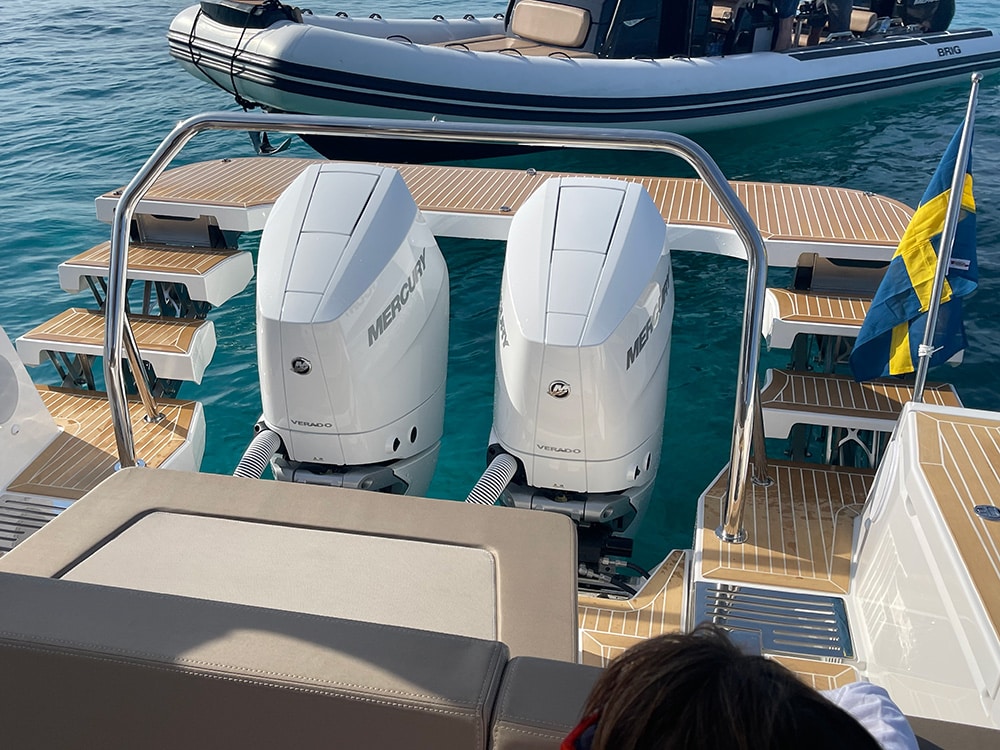
One of my favourite features, the clever optional hydraulic bathing platform
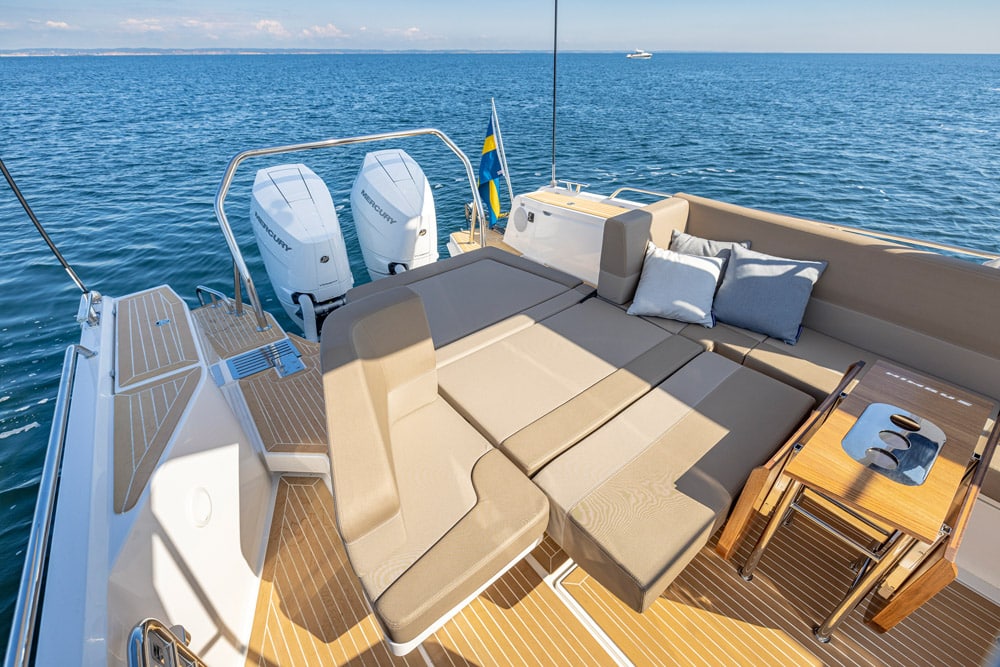
The twin Mercury 400hp Verado’s produce a top speed of 49 knots.
Weekends away
Thanks to her master double cabin with its associated shower and heads compartment, plus smaller twin mid cabin, the W11 makes for a very well-appointed family weekend cruiser. But if you’re thinking that she’s only really suited to blue-water use, then fear not, because the W11’s custom pack includes all the necessary fabric canvas panels to completely enclose the cockpit and aft deck for all-weather/all-year-round use. She’s definitely built with the intention of extended voyaging in mind, and being a smidgen under 13m in length, the W11 still remains highly suited to coastal adventuring and inshore exploration. Thanks also to her powerful bow thruster, optional Mercury joystick piloting and active trim, as well as, in the case of our test boat, a Quick gyroscopic stabilisation system, close quartering and holding station are both simplified and made all the more comfortable for everyone aboard.
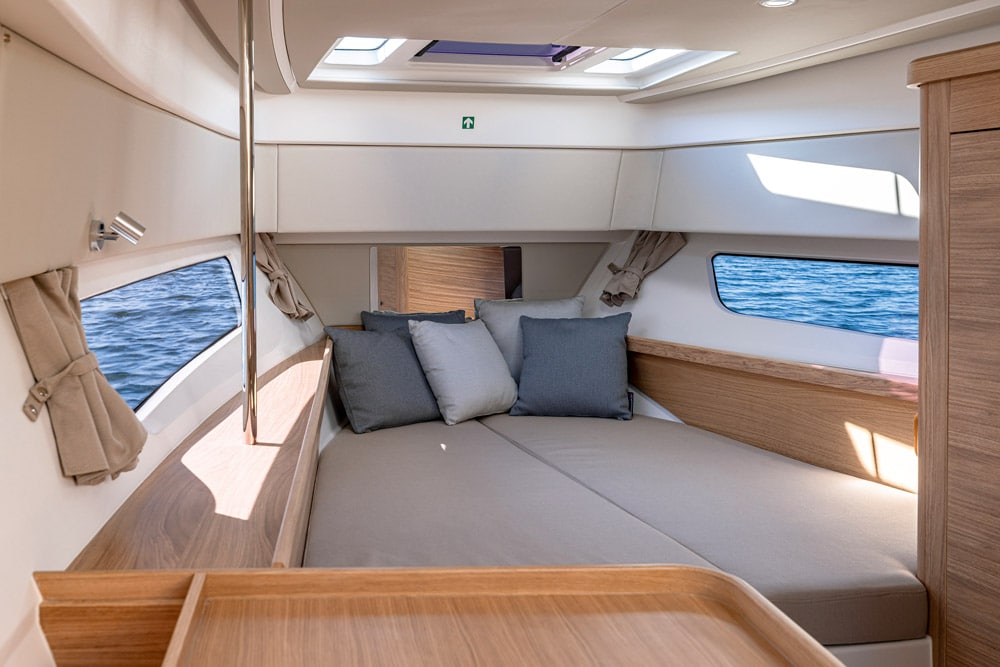
Master cabin with associated shower and heads.
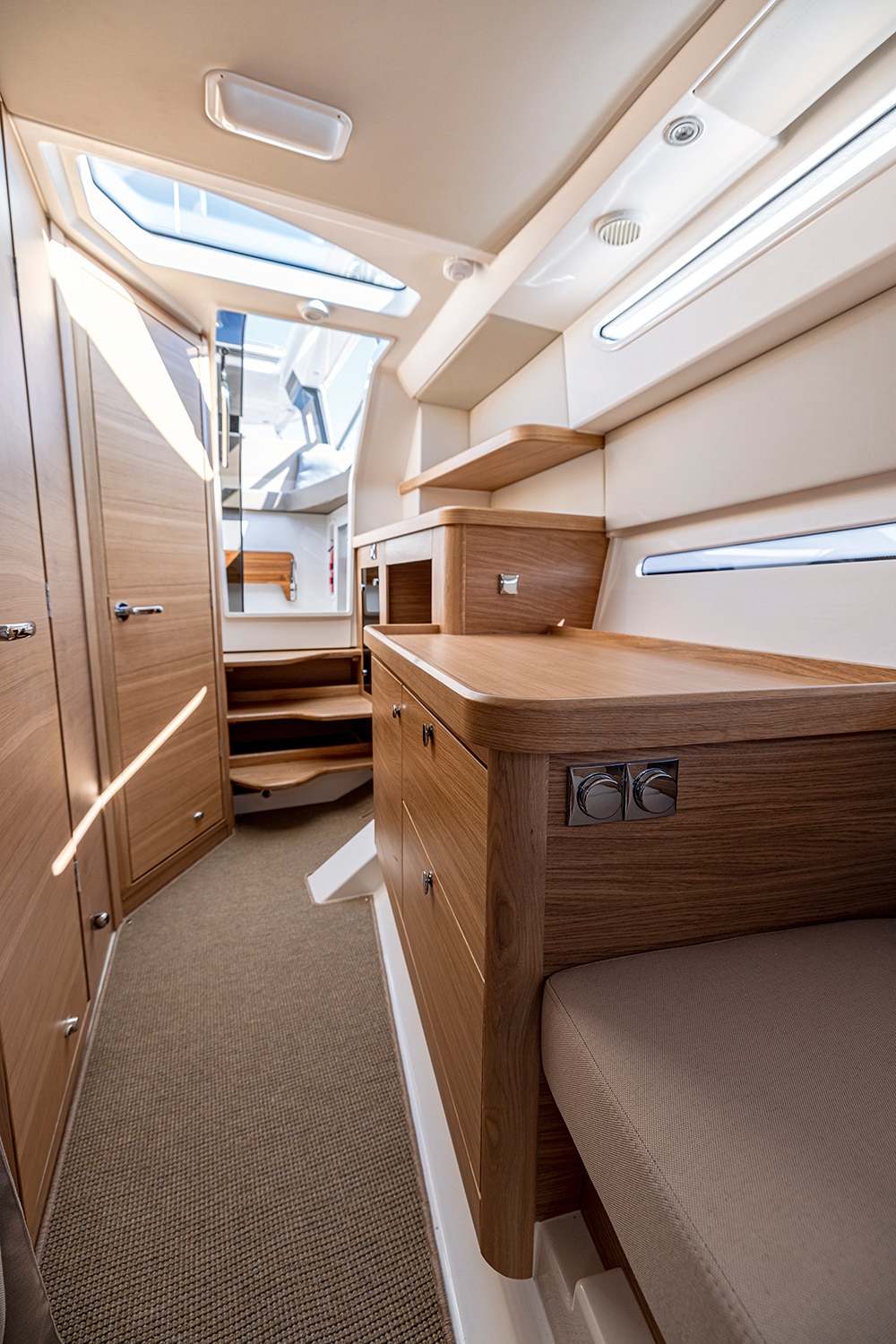
Plenty of storage down below with good width and easy access.
Sensible ‘Scandi’
The boat’s Scandinavian-influenced, typically understated persona, I’m sure, will prove very attractive to many – not least those who favour a motor yacht of mature stature coupled to an appearance suggesting genuine seagoing intent. In terms of the latter, weighing not far off 6000kg, the W11 is a very stable, well-planted craft to drive. Not surprisingly, she handles impeccably in a seaway. Her deep-vee hull, with its 24-degree deadrise, when married to a pair of Mercury 400hp outboards, helps to deliver a fuel burn rate of 60L per hour, per engine. As stated at the outset, though capable of 49 knots, her hull feels more hydrodynamically suited to performing at cruising speeds, and it’s within this ‘bandwidth’ that the W11 really shines.
As for the hefty price tag, the boat as tested was ultra-spec’d and loaded with every conceivable extra, with the aim of demonstrating all the options this particular model can potentially be supplied with. For instance, the gyro stabilisation system alone costs almost 40,000 euros. So, if necessary, the overall price could likely be trimmed by as much as 200k.

Specifications
- Length: 12.4 (40ft 7in)
- Width: 3.46m (11ft 4in)
- Weight (inc. 300hp engine): 5600kg (12,345lb)
- Draught: 0.9m (3ft)
- Height: 3.75m (12ft 3in)
- Fuel capacity: 850L (224.5 US gal)
- Water capacity: 135L (36 US gal)
- Black-water tank: 80L (21 US gal)
- Grey-water tank: Optional
- Refrigerator capacity: 70cu. m (2.47cu. ft)
- Design category: B10, C12
- Number of beds: 4 (2+2)
- Speed: +40 knots
Price
- As tested: 616,490 euros (ex. VAT)


